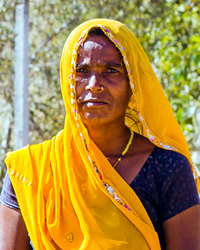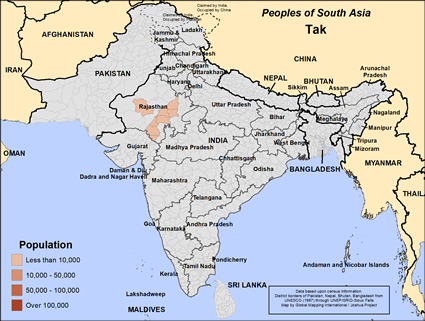Tak in India

Photo Source:
Joel Miller
|

Map Source:
People Group data: Omid. Map geography: UNESCO / GMI. Map Design: Joshua Project
|
| People Name: | Tak |
| Country: | India |
| 10/40 Window: | Yes |
| Population: | 2,100 |
| World Population: | 2,100 |
| Primary Language: | Mewari |
| Primary Religion: | Hinduism |
| Christian Adherents: | 0.00 % |
| Evangelicals: | 0.00 % |
| Scripture: | New Testament |
| Ministry Resources: | Yes |
| Jesus Film: | Yes |
| Audio Recordings: | Yes |
| People Cluster: | South Asia Hindu - other |
| Affinity Bloc: | South Asian Peoples |
| Progress Level: |
|
Introduction / History
The Tak people of Rajasthan, India have a history that is deeply tied to the region's arid landscape. Historically, they were known as a land-owning community, with many Taks involved in agriculture and local trade. Over the centuries, they have adapted to the changing socio-political landscape of Rajasthan, transitioning from feudal landholders to engaging in modern agricultural and business practices. Despite the changes, the Tak people have maintained a distinct community identity rooted in Rajasthan's rural traditions.
What Are Their Lives Like?
The Tak people primarily reside in rural areas where they engage in farming and animal husbandry. Agriculture is central to their livelihoods; they cultivate crops such as wheat, barley and pulses. Given the semi-arid climate of Rajasthan, farming is dependent on seasonal monsoons, and many Tak families practice subsistence farming, using traditional methods passed down through generations. In addition to farming, some Tak families raise livestock such as goats and cattle, which are valuable for both food and income.
Tak villages are typically composed of extended family units and the community places a strong emphasis on family ties and mutual support. Homes are built from locally available materials like mud, stone and thatch designed to withstand the harsh desert climate. While some have migrated to urban areas for better employment opportunities, most Tak people continue to live in rural settings, connected to their land and agricultural practices.
What Are Their Beliefs?
The Tak people practice Hinduism and their religious beliefs are integral to their daily lives. They worship a variety of Hindu deities, with particular reverence for local gods and goddesses associated with agriculture and nature. Temples and shrines dedicated to these deities are common in Tak villages, where community members gather for religious festivals and rituals.
Religious ceremonies, particularly those related to agriculture, are important in Tak life. They celebrate festivals such as Diwali and Holi, and they make offerings to ensure successful harvests and the well-being of the community. Ancestor worship is also a key component of their belief system, with regular rituals held to honor their ancestors and seek their blessings.
What Are Their Needs?
The Tak people face several challenges, particularly in terms of economic development, access to education and healthcare. Their dependence on traditional farming methods makes them vulnerable to environmental changes, such as droughts and unpredictable rainfall, which can threaten their livelihoods. Improved access to irrigation, modern agricultural tools and sustainable farming practices would greatly enhance their ability to cope with these challenges.
Education remains limited in many Tak villages, especially for girls. This lack of access to quality education restricts opportunities for social and economic mobility, perpetuating cycles of poverty within the community. Healthcare services are also scarce, with many villages lacking basic medical facilities, leading to high rates of preventable diseases and malnutrition.
Development programs that focus on improving healthcare, education and agricultural sustainability would significantly benefit the Tak people. These initiatives should respect their cultural and religious values, empowering them to thrive in a changing world while preserving their traditional way of life.
Prayer Points
Pray or God's blessing, strengthening and healing of families and communities within this people group through the abundant life Jesus offers to all people who call on his name.
Pray for deliverance from the fear that hinders God's blessing from multiplying through the families and communities in this people group.
Pray for God's blessing on the leaders in this people group, along with their families and for their communities to welcome and enjoy God's blessing.
Pray for the Lord to multiply the reception and influence of his word among this people group, leading them to love him with their whole being.